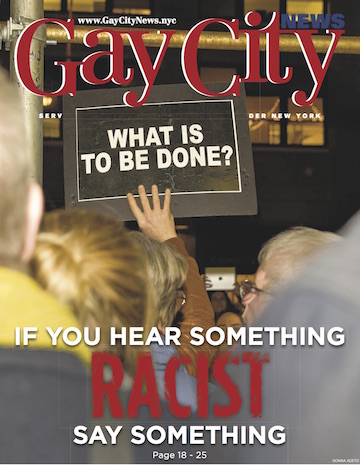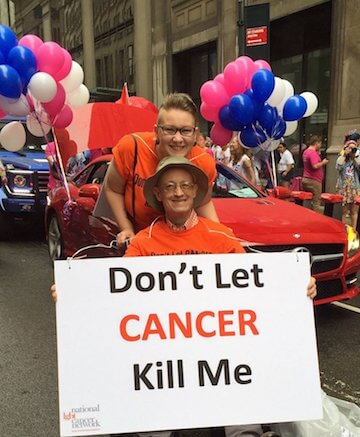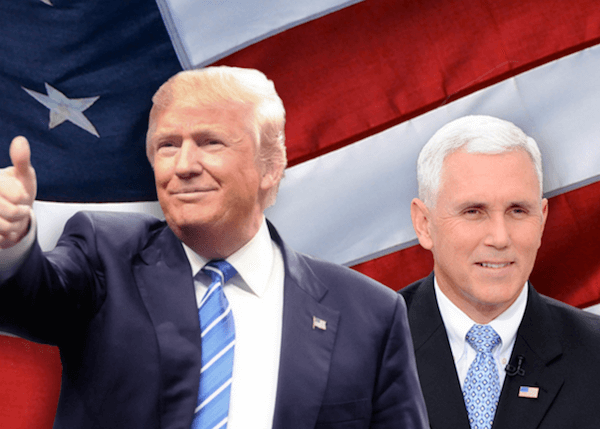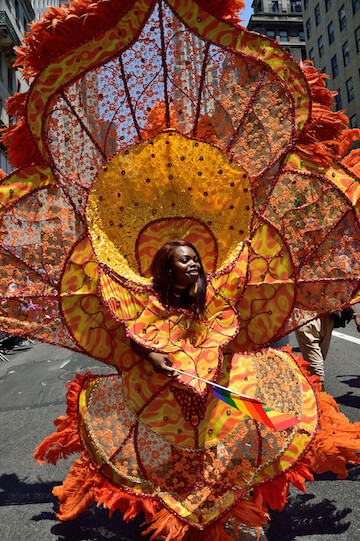COVER PHOTO BY DONNA ACETO
Last week, Gay City News reached out to Clarence Patton — a longtime African-American gay leader and former executive director of the New York City Anti-Violence Project who now heads up the Pipeline Project and Pipeline Consulting — asking him to write about President Donald Trump’s “shithole countries” comment and the resistance to both his administration and racism in America generally. At Patton’s suggestion, instead he engaged in an online dialogue with editor Paul Schindler. Highlights of the conversation follow.
PAUL SCHINDLER: Hi Clarence. Given the president’s “shithole countries” comment yesterday, I will preface this request by acknowledging three things I think I already know about your thinking: (1) that we didn’t really learn anything more about Trump’s racism yesterday; (2) the racism didn’t just spring up since January, 2017; and (3) as you once wrote, this one’s for you, White folks, to address this shit. That said, I would really love if you’d be willing to write something for next week’s issue about how people should respond. In tandem with yesterday’s Immigration and Customs Enforcement action here in New York and the protest and police over-response that followed, I feel like this might be something of an inflection point. Let me know what you think.
CLARENCE PATTON: Hey Paul, I’m wondering what I could say that’s not already been said. A counter idea could be more of a collaborative thing — which would actually be more in the spirit of where my head’s at, as you’ve noted: I believe it’s the responsibility of White folks to get it together. What that would look like is a co-written piece or the transcript of a conversation, perhaps this one you’ve started here.
PS: Well, in part, I am eager to get voices in next week because I am feeling plum out of ways to write about this stuff. I’d love to set aside a specific time to do that so I am not facing other distractions.
CP: The reason I think the collaborative thing might work and be more interesting and useful is that if you’re looking to get different voices into the paper it works for that. And if I’m looking to encourage more White folks to speak/ act on these things, it works. I’m not opposed to a solo piece, but it’d again be a POC preaching at White folks, who’d then either be offended, be sheepishly obedient because some magical Black oracle told them what to do, or have some other useless response.
PS: Let’s do the dialogue. [That dialogue followed one day later.]
PS: Hi Clarence, I reached out to you because this past week’s comments from Donald Trump about “shithole countries” drove home for me how unending his outbursts are, the fact that we have no idea how extreme his outrages and actions may become, and just how futile it can sometimes feel in figuring out how we should respond to him. Readers probably have a good idea of the kind of work you did when you led the Anti-Violence Project, but before we dive into the Trump matter, can you briefly describe the work you’re doing now?
CP: I’m both director of the Pipeline Project, which focuses on leadership development and advancement for LGBT People of Color, primarily in the non-profit sector, and principal of Pipeline Consulting, a related consulting firm that engages in organizational development and change work, also primarily in the non-profit sector. I started Pipeline as I was leaving AVP.
The Pipeline Project's Clarence Patton. | COURTESY OF CLARENCE PATTON
PS: When I first approached you about writing an op-ed, you wondered what you could say that was new in light of the storm of reaction to Trump unleashed immediately after his comments were reported. Does that reflect your frustration that you and others of us who are critics of the president are stymied in finding new and effective ways to counter the negative impact he’s having on the country. In essence, that we all react the same way but are not able to get our thinking across to those on the other side?
CP: For me personally, not really or precisely. My frustration stems from the sense that after every new outrage — particularly around race — Trump-perpetrated or otherwise (i.e., the election of Trump was about more macro race issues than “just Trump”) — America, White America, specifically and in particular, acts as though this is the first thing versus the latest in a long history of things, let alone a signifier or symptom of our still-unresolved racial issues, challenges, and deficits. That denial and short memory are frustrating, exhausting, annoying, and dangerous. By the way, I’m sure there’ll be lots of White folks reading that saying, thinking, or responding, “Not me!,” which is not helpful…
PS: You mean the denial and short memory of White America writ large about the history and persistence of racism, right?
CP: Yes.
PS: And I guess, not even writ large, which I suppose is a way of excluding myself, but in White America as a whole?
CP: I almost challenged you on the “writ-large” thing a second ago, but again… #exhaustion, LOL! Look, just about every Black person recognizes the fact that they are made responsible for how Blacks “writ-large” are viewed; it’s a significant benefit of privilege that Whites don’t — and don’t have to — carry that same anxiety for their community.
PS: Fair enough. On Facebook, on at least one occasion — and you may have touched on this point on many occasions — you talked about this being a problem that White people need to take leadership on, and I think I have a sense of where you’re going with that, but, first, am I summarizing your view correctly, and secondly, can you drill down more specifically on what that means for me or any other white person reading this — or not reading this?
CP: Sure. In this country and context, White folks set up, maintain, benefit from, and at times violently enforce our racial codes and rules. They also — through the political and financial power they hold — do it through policy at the macro level and discrimination at the individual level, both knowingly and unconsciously. Whites also — despite some of their anxiety — remain the plurality in this country. So by the numbers, the dollars, and the levers of power, Whites hold most if not all the cards — and that will remain so for decades, at least. How in the world could resolution to something that’s a core part of America’s DNA ever change without White will?
And here’s the kicker, in order for it to change, White advantage would have to be compromised. The meeting where that’s negotiated would be a fun meeting to attend… The other piece driving my saying that — in the political context — is that it’s White folks voting for these fools, from Trump on down. They need to engage in behavior change.
PS: So, first, responding to the “advantage being comprised” comment, there is an element here of certain situations being zero-sum, is that right? That some power and advantage need to be surrendered to rectify wrongs and inequalities?
CP: Not necessarily zero-sum…
PS: But sometimes some advantages need to be surrendered in the interest of equity?
CP: I believe that if everyone were actually allowed to perform at the height of their skill, productivity, and pleasure, we’d actually have expanded opportunity. For instance, what’s been the cost — material and otherwise — to things like: (1) Barring Blacks from GI mortgages after World War II? Allowing them access wouldn’t have disallowed Whites from it. (2) What did America lose as it enforced laws and policies that specifically sought to under-educate Black children? (3) We know it costs more to house someone in prison than to educate them, yet we’ve made a choice to spend the extra money disenfranchising people versus educating them. I think the advantages you’re talking about would dissipate in a true meritocracy anyway since they’re often false.
PS: Let me shift over to your point about White folks voting for these fools, from Trump on down. I’m guessing in your typical day, Clarence, most of the White folks you meet did not vote for Trump, but you also say “it’s not helpful,” for that group, including me, to say, “He’s not talking about me.” Can you say more about that?
CP: We’ve got a guy now who was born as a member of the Lucky Vagina Lottery, whose two closest “advisors,” his daughter and son-in-law, are also simply members of the Lucky Vagina Lottery, with no other discernible qualifications for anything really. Without bogus advantage, the man in the White House likely would’ve been shaking a cup for money years ago.
PS: So we all need to acknowledge our privilege and our advantage if we are to move toward greater or true equality? And even a lot of us who despise Trump won’t do that?
CP: Acknowledge and manage. And nope.
PS: Nope, we won’t do that, you mean?
CP: Yes. Even though those folks may not have voted for Trump, their privilege preexisted him. And what was their pre-Trump privilege-mitigation strategy?
Gay City News editor-in-chief Paul Schindler. | DONNA ACETO
PS: Maybe 75 years ago, a prominent Swedish sociologist, Gunnar Myrdal, writing from outside, said race is the central issue in American life. Do you agree with that?
CP: Yes. I agree with that. It’s just that White folks don’t realize it, while the rest of us have to if we’re going to survive and manage the system we’re in. In part because “the system” is the water White folks are swimming in that can drown the rest of us. I have lots of White folks whom I love and love me in my life, BUT… there certainly have been an uncomfortable number of instances when some of them have actively or in effect let me down when the need for them to sacrifice their racial comfort on my behalf has arisen.
PS: This is a tough question, but can you thumbnail an example of that unwillingness to sacrifice White racial comfort? I think that would add depth to folks’ understanding of your point.
CP: Sure, in college one of my best friends said I could rent the spare room in the apartment he was renting with a couple of his friends. At the end of summer, when those friends arrived, their parents freaked out that this Black guy was there. I had to leave. Fortunately, other friends let me stay at their place until my fall lease started.
PS: I’m trying to adequately express my “wow” to that.
CP: LOL. But there have been (good) surprises from White folks, too.
PS: Let me talk about other divisions beyond race — class, education, religion, geography. Do you think that, let’s say, a white Jewish or agnostic progressive from New York or Chicago or Austin is going to be any more effective than a black woman from Detroit or Oakland in speaking to the racial antagonisms or anxieties of white voters outside the big cities?
CP: I don’t know that one would be more effective than the other… what doesn’t help is what I call “bullshit” about the racial anxieties of White voters/ people inside (let’s be honest about even parts of New York) and outside the big cities. I remain one of those people who says that if they’re too dumb to recognize that their racial animus is stupid, misplaced, and masking economic and (their own) cultural anxieties and they keep supporting folks who create and/ or exacerbate those anxieties, then aren’t they kind of stupid by definition? I’m not good on that since I don’t have any empathy in that direction.
PS: Okay, I follow that. So then I think I sense what your response to the following question may be: There was a lot of talk after the election about how Democrats and/ or Hillary Clinton were not speaking to the economic and cultural anxieties of voters in many parts of the country. What’s your view of that perspective, and do you worry that in trying to reach out to those voters progressives might be inclined in some way to co-sign racist attitudes?
CP: There was a quote going around this week about convincing the lowest White man that he’s better than the best Black man… She/ they — perhaps they could’ve done better. But I bet the ones who voted for Trump weren’t listening anyway, and probably wouldn’t have. Plus, electorally no one needs them — certainly not on the left — to win. If you can keep the natural coalition as it stands now, energize non-voters who were really at fault for her loss, and perhaps bring over some of the White women who really fucked all of us in 2016, then you can win… just about everywhere.
PS: So you’re saying, first, that Trump was playing directly to racist attitudes and worldviews and that with him doing it, Clinton did not have a chance to make a pocketbook argument to them? But also that reaching those voters is not key to a winning strategy?
CP: Well, you also have to remember that after Obama, White folks needed a reassuring “re-set.” That “lowest White man” quote is important because as I said during Obama’s administration every time White folks lost their minds — which was frequently— that Obama had broken the White folks. His existence, his proficiency, his (and his family’s) beauty, his eloquence, his “goodness” (remember, within a year look at Trump’s scandals; we’re still waiting for the “Wolff book” on Obama… it’s apparently never going to come) was a shock to the system of those White folks. So a reassuring, completely unhealthy bit of Caucasian hatred was called for.
PS: If those voters aren’t needed, are their hearts and minds ever going to be changed, and is there any value in communities of color and/ or their leaders trying to engage them?
CP: Not to my mind; others may rightfully feel differently. That’s where King was going before he was killed, but I’ve got no interest in it myself.
PS: How has the Trump era changed the way you do your work? Do you feel that communities of color and other communities under siege are significantly more mobilized than before and, if so, are you confident that can be sustained over the long haul?.
CP: We all have limited resources, and I think that if there are some folks who think they can work with those White folks to pull them out of what at this point is living in a place of pure unreality, then I say, “Have at it.” It’s just not of interest to me.
PS: And on the question of mobilization in communities of color and on the left?
CP: With respect to my work, the core hasn’t changed much. What have been large and clearly growing emphases are those of “care” and “sustainability.” And I definitely think there’s more mobilization in communities of color. We know the score.
PS: Sustainability is keeping the push going and growing. What is care?
CP: Care is self-care and care for our colleagues, friends, and family.
PS: The Times did a story getting person on the street reaction in Africa to the “shithole countries” comment and one woman from Rwanda said that he’s trolling the whole world and we have to stop “feeding the troll.” Do we all overreact to everything he says, do we help him distract from other issues, or is it necessary to call him out each and every time? Will that help in peeling off his 2016 voters who held their nose when they supported him?
CP: I’ve often had a problem when people have tut-tutted the attention paid to his inappropriate or hateful things fearing that it takes our eyes off the larger policy ball… as if we don’t have the capacity or smarts to do both. It’s bullshit. For me, if he’s throwing out red herrings (and I do not believe he is that smart or deliberate) to distract from hateful policy, but in doing so is further eroding the national discourse and inuring us to racist, sexist, and xenophobic ideas, then one is as important at the other. If people don’t have the capacity to focus on and process both, then that’s unfortunate, but it’s their problem and they shouldn’t whine to the rest of us or attempt to compel us to limit our own ability to multi-task or manage the whole picture.
PS: Last question: Can this country eventually get beyond what Trump has unleashed or given voice to, or are the kinds of divides we are seeing now something we need to be prepared to confront over the foreseeable future? Do you have any optimism that demographics — both the greater diversity of American society and the aging of young people with more positive attitudes — will decide this battle?
CP: The better part of me actually thinks that this is the final throes of this stuff — and it’s gonna be/ is a motherfucker. And if we can make it through, we’ll be better. BUT, we need to do the work; and as per where we started, White folks need to do the yeoman’s amount of it. So if White folks are not prepared to be uncomfortable for a bit while we fight and work through this shit, then the lesser part of me that thinks that “This is just and will always be America” will be proven right, but hey, I’ve got friends who’ll put me up in Amsterdam and France, so… there’s that. Strike one up for Black folks with some privilege and resources. It’s those of us without that are the real concern.
PS: Anything else you want to say that I should have brought up?
CP: Congrats for “phoning a friend.” Black friends and white friends are going through/having that same exchange all over the place these days.






































